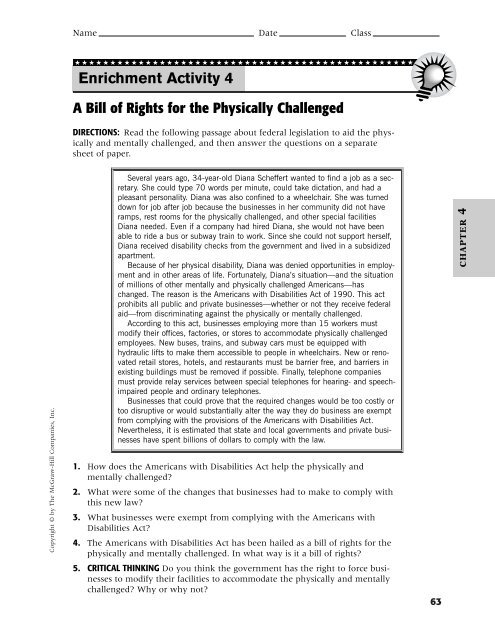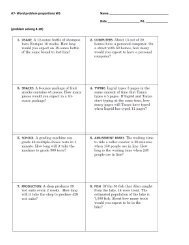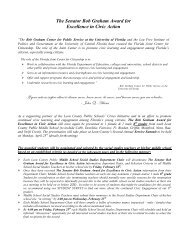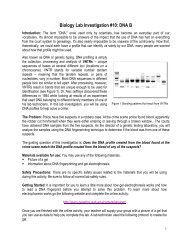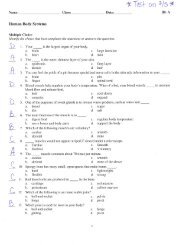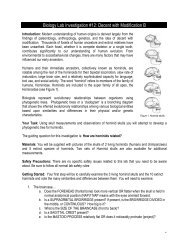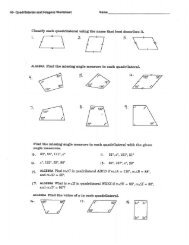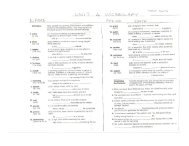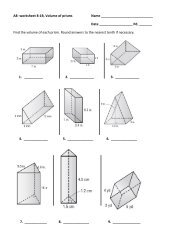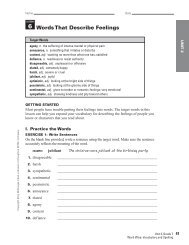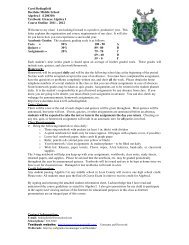Unit 1 Resources: Foundations of American Citizenship - Deerlake ...
Unit 1 Resources: Foundations of American Citizenship - Deerlake ...
Unit 1 Resources: Foundations of American Citizenship - Deerlake ...
Create successful ePaper yourself
Turn your PDF publications into a flip-book with our unique Google optimized e-Paper software.
Name Date ClassEnrichment Activity 4A Bill <strong>of</strong> Rights for the Physically ChallengedDIRECTIONS: Read the following passage about federal legislation to aid the physicallyand mentally challenged, and then answer the questions on a separatesheet <strong>of</strong> paper.Copyright © by The McGraw-Hill Companies, Inc.Several years ago, 34-year-old Diana Scheffert wanted to find a job as a secretary.She could type 70 words per minute, could take dictation, and had apleasant personality. Diana was also confined to a wheelchair. She was turneddown for job after job because the businesses in her community did not haveramps, rest rooms for the physically challenged, and other special facilitiesDiana needed. Even if a company had hired Diana, she would not have beenable to ride a bus or subway train to work. Since she could not support herself,Diana received disability checks from the government and lived in a subsidizedapartment.Because <strong>of</strong> her physical disability, Diana was denied opportunities in employmentand in other areas <strong>of</strong> life. Fortunately, Diana’s situation—and the situation<strong>of</strong> millions <strong>of</strong> other mentally and physically challenged <strong>American</strong>s—haschanged. The reason is the <strong>American</strong>s with Disabilities Act <strong>of</strong> 1990. This actprohibits all public and private businesses—whether or not they receive federalaid—from discriminating against the physically or mentally challenged.According to this act, businesses employing more than 15 workers mustmodify their <strong>of</strong>fices, factories, or stores to accommodate physically challengedemployees. New buses, trains, and subway cars must be equipped withhydraulic lifts to make them accessible to people in wheelchairs. New or renovatedretail stores, hotels, and restaurants must be barrier free, and barriers inexisting buildings must be removed if possible. Finally, telephone companiesmust provide relay services between special telephones for hearing- and speechimpairedpeople and ordinary telephones.Businesses that could prove that the required changes would be too costly ortoo disruptive or would substantially alter the way they do business are exemptfrom complying with the provisions <strong>of</strong> the <strong>American</strong>s with Disabilities Act.Nevertheless, it is estimated that state and local governments and private businesseshave spent billions <strong>of</strong> dollars to comply with the law.1. How does the <strong>American</strong>s with Disabilities Act help the physically andmentally challenged?2. What were some <strong>of</strong> the changes that businesses had to make to comply withthis new law?3. What businesses were exempt from complying with the <strong>American</strong>s withDisabilities Act?4. The <strong>American</strong>s with Disabilities Act has been hailed as a bill <strong>of</strong> rights for thephysically and mentally challenged. In what way is it a bill <strong>of</strong> rights?5. CRITICAL THINKING Do you think the government has the right to force businessesto modify their facilities to accommodate the physically and mentallychallenged? Why or why not?63CHAPTER 4


